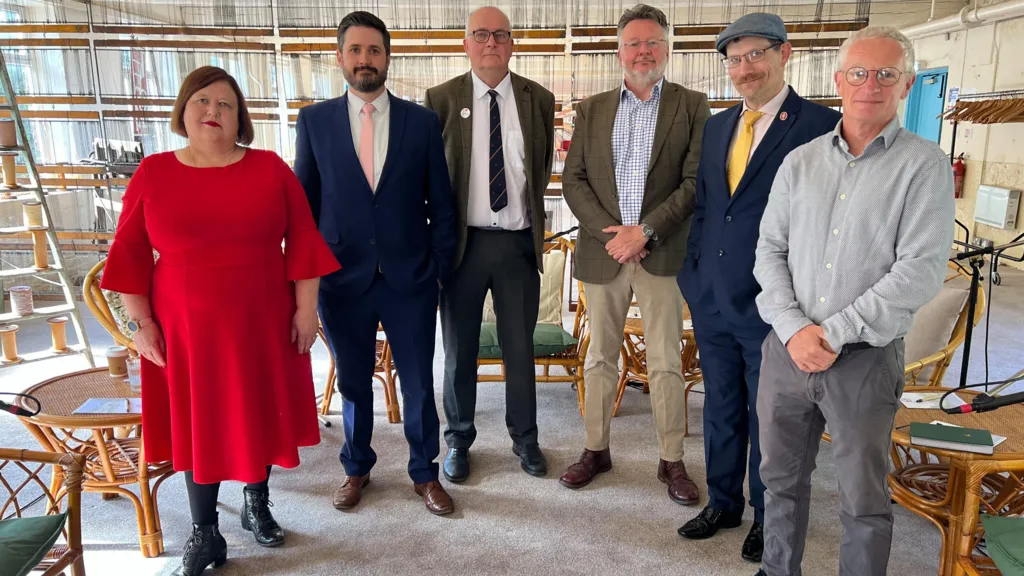Six leaders standing for election to Derbyshire County Council outlined their views on a range of topics during a debate.
Social care, the state of the county's roads, tourism and trust in politicians were among the issues discussed during the event hosted by BBC Radio Derby.
The candidates were also asked who they would be willing to do a potential deal with in the event no one party gets a clear majority on the council.
The leader of an independent party was also included, reflecting the wide range of independent candidates standing across Derbyshire.
Those who took part were:
- Joan Dixon, Derbyshire Labour leader
- Ed Fordham, Derbyshire Liberal Democrats leader
- Gez Kinsella, Derbyshire Greens leader
- Barry Lewis, Derbyshire Conservatives leader (and current leader of Derbyshire County Council)
- Stephen Reed, Derbyshire Reform UK candidate
- Philip Rose, Amber Valley Independents leader
Here are four key takeaways from the debate.
Clashes on social care
Numerous council-run care homes and day centres have closed in recent years in Derbyshire.
It is an issue that has sparked fierce campaigning among families whose elderly relatives have been left facing disruptive moves or paying for expensive private provision.
When asked about the future of social care in the county, divisions emerged.
The Liberal Democrats' Ed Fordham called on the Conservatives' Barry Lewis to apologise, calling the handling of the issue "shameful".
Lewis insisted he was proud of his record on social care and said his party had done "the best we can" given pressures on the authority's budget.
But Fordham said the Conservatives had "starved our care homes of money", leading to closures.
"We spend money badly and he knows it," he added.
The Green's Gez Kinsella agreed with the criticisms and accused Lewis of refusing to take the views of local people into account when deciding to close care homes.
Reform UK's Stephen Reed described the situation as a "crap sandwich" and held it up as a key area where the party would deploy its anti-waste agenda.
Labour's Joan Dixon conceded there was no money pledged from central government to improve the local picture, amid calls from Independent Philip Rose for Whitehall to boost funding.
Dixon added that Labour wanted to look at alternative "cooperative or not-for-profit" models of care.
Deal or no deal
While some national leaders have been keen to rule out the prospect of their party entering into formal coalitions, Derbyshire's leaders indicated they may be open to some form of deal in the event no party wins an outright majority on the council.
Stephen Reed, for Reform UK, dismissed a formal coalition but suggested something more informal would be acceptable.
"We'll work with any party to do the right thing. We won't form a coalition, but we'll work with all the parties," he said.
Barry Lewis, for the Conservatives, did not rule anything out, saying the party would be open to anything in the spirit of "getting things done".
Joan Dixon, for Labour, added: "Let the dice roll where they will and then I will think about that depending on what happens on 2 May."
The Liberal Democrats, however, said the party would refuse to work with Reform UK, whilst the Greens said they would look at it "issue by issue".
Trust in politicians
Trust in politics and politicians was another topic raised during the debate.
The Greens' Gez Kinsella said he had been struck "more than ever before" by the number of people he had come across during the campaign who are "turned off" by politics and and drawn to parties like Reform UK, who he claimed would pose "risks" to the county if they gained power.
Reform UK's Stephen Reed was challenged about a Reform candidate in Derbyshire who it is understood is under investigation for posting a racial slur online.
He refused to comment but insisted support for Reform was "enthusiastic".
